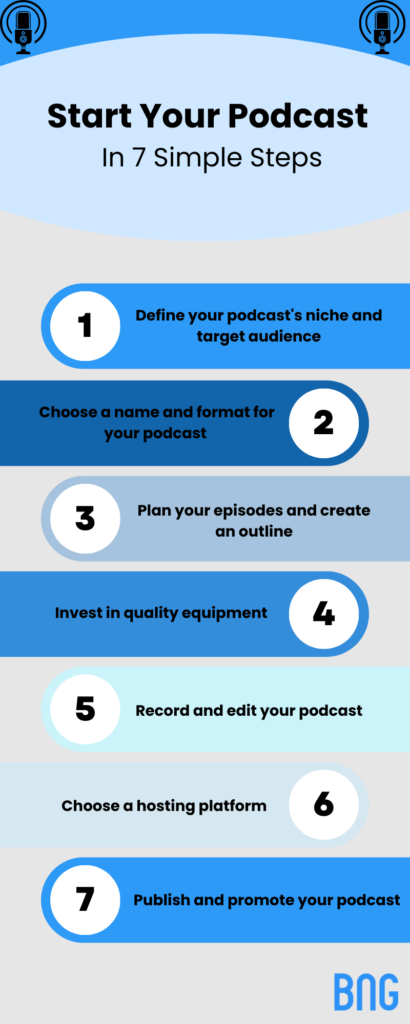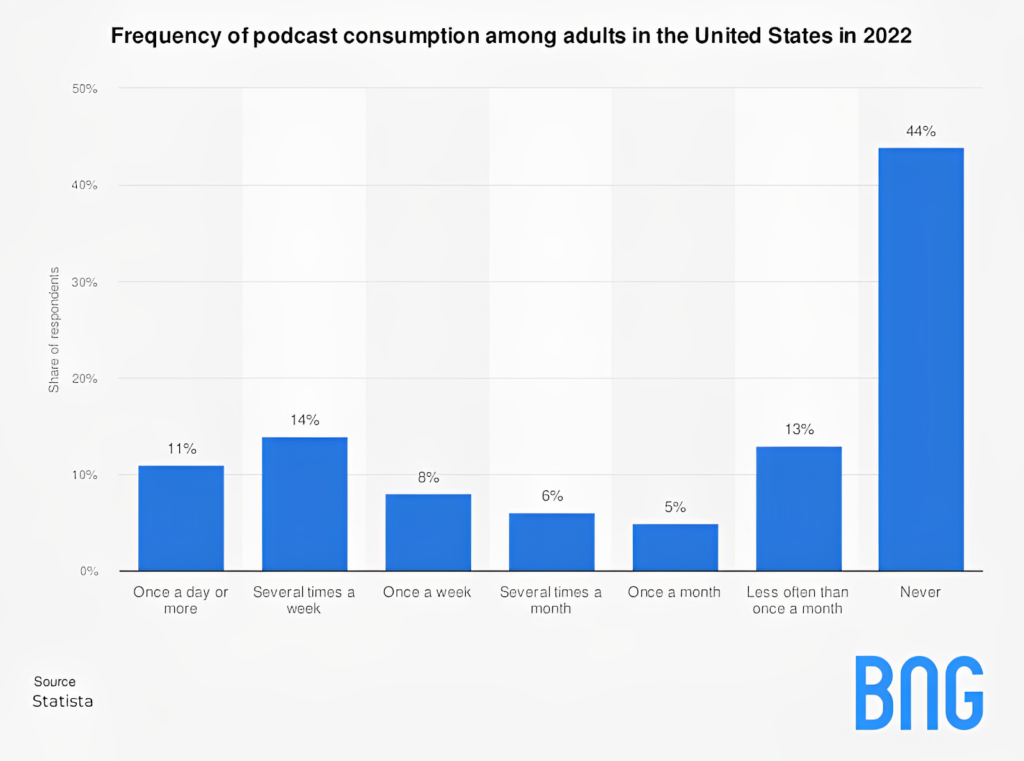Podcasts have become increasingly popular in recent years, and for good reason. They offer a unique platform for storytelling, sharing information, and connecting with a wider audience. Starting a podcast may seem daunting, but it’s actually quite simple with the right tools and steps. In this step-by-step guide, we’ll walk you through everything you need to know to start your own podcast.
Podcasts For Beginners Steps
Follow these seven steps to navigate the world of podcasting without an existing audience:
- Step 1: Define Your Podcast’s Niche and Target Audience
- Step 2: Choose a Name and Format for Your Podcast
- Step 3: Plan Your Episodes and Create an Outline
- Step 4: Invest in Quality Equipment
- Step 5: Record and Edit Your Podcast
- Step 6: Choose a Hosting Platform
- Step 7: Publish and Promote Your Podcast

MORE: The podcast tips you need to know
Step 1: Define Your Podcast’s Niche and Target Audience
Before you start creating your podcast, you need to define your niche and target audience. Your niche is your podcast’s specific topic or theme, and your target audience is the group of people who will be interested in listening to it. When defining your niche, consider what you’re passionate about, what topics you’re knowledgeable about, and what you want to share with your audience.
What is Your Podcast Niche?
| Examples of Niche Topics | Explanations |
|---|---|
| Environmental sustainability. | Discussing the latest trends and solutions for a greener world. |
| Virtual reality and gaming. | Discussing the latest innovations in gaming and virtual reality. |
| History of a specific region or culture. | Diving into the history and culture of a particular place or people. |
| Alternative health and wellness practices. | Exploring alternative therapies and practices for health and wellness. |
| Personal finance for millennials. | Tips and tricks for managing money and investing for the future. |
| Urban exploration. | Exploring abandoned and forgotten places in cities around the world. |
MORE: Who are the top podcasters?
Who Are Your Target Audience?
The target audience for a podcast can vary depending on the topic and format of the show. However, here are some common characteristics of potential podcast listeners:
- People with a specific interest or passion related to the topic of the podcast,
- Individuals who are looking to learn something new or expand their knowledge,
- Commuters who have a long drive or commute to work,
- Stay-at-home parents or individuals who spend a lot of time at home and want to listen to something entertaining or informative,
- Students who want to supplement their learning with additional resources,
- Busy professionals who prefer to listen to podcasts during their downtime or while doing other tasks,
- People who enjoy listening to stories, interviews, and conversations,
- Fans of the podcast host or guests featured on the show.
Remember that it’s important to decide early on about who you’re talking to and what the topic of your podcast is. This will help to create a dedicated following to your podcast, and raise its chances of success.
MORE: Podcast listener statistics
Step 2: Choose a Name and Format for Your Podcast
Podcast branding is essential for your podcast’s success. Your podcast’s name should reflect your niche and be easy to remember. Once you’ve decided on a name, you need to choose a format for your podcast. Will it be a solo show, an interview-style show, or a panel discussion? Consider your strengths as a host and what format would be the most engaging for your target audience.
Not sure how to decide on the perfect name for your podcast? Don’t worry, we have you covered. Choosing a name will be easy with our free Podcast Name Generator.
In just three simple steps, you’ll have the perfect podcast name:
- Type in a few keywords that you want associated with your podcast.
- Choose the generated name that comes up in the Podcast Name Generator.
- Buy the domain name.
So easy!
Here are a few examples of podcast names to get you started:
- Future Forward
- Bold Voices
- Coffee & Culture
- Hidden Games
- Mindful Musings
MORE: What business category is a podcast?
Step 3: Plan Your Episodes and Create an Outline
Before you start recording, it’s essential to plan your episodes and create an outline for each one. This will help you stay on track and ensure that you’re providing valuable content for your listeners. When creating your outline, include an introduction, main points, and a conclusion. You can also include segments such as Q&A or listener feedback.
Use this template as an example for a podcast outline:
I. Introduction
- Introduce the podcast host and any guests
- Provide an overview of the topic for the episode
- Share any relevant updates or news related to the podcast
II. Main Topic Discussion
- Dive into the main topic of the episode
- Provide context and background information as needed
- Share insights, opinions, or perspectives related to the topic
- Offer examples or anecdotes to illustrate key points
III. Guest Interview (if applicable)
- Introduce the guest and their background or area of expertise
- Conduct an interview with the guest related to the main topic
- Allow the guest to share their insights and experiences related to the topic
- Offer follow-up questions or prompts as needed to keep the conversation flowing
IV. Q&A
- Address any questions or comments submitted by listeners prior to recording
- Answer questions related to the main topic or other relevant topics
- Offer insights or advice based on listener questions or comments
V. Conclusion
- Summarize the key points discussed in the episode
- Thank any guests or sponsors involved in the episode
- Promote upcoming episodes or events related to the podcast
- Provide contact information or links for listeners to connect with the podcast host or guests.
MORE: How to write a podcast script
Step 4: Invest in Quality Equipment
Investing in quality equipment will ensure that your podcast sounds professional and is easy to listen to.
What is the Bare Minimum to Start a Podcast?
At a minimum, you’ll need a microphone, headphones, and recording software. You can start with basic equipment and upgrade as you grow your audience and budget.
MORE: Everything you need to know about podcast equipment
Step 5: Record and Edit Your Podcast
Once you have your equipment, it’s time to record and edit your podcast. Find a quiet place to record and use your outline as a guide. When editing your podcast, remove any mistakes or unnecessary pauses, and ensure that the audio levels are consistent throughout.
Step 6: Choose a Hosting Platform
To publish your podcast, you’ll need to choose a hosting platform. This is where your podcast will be stored and distributed to podcast directories such as Apple Podcasts and Spotify. There are many hosting platforms to choose from, including Buzzsprout and Libsyn.
Did you know?
According to the statistics provided by Statista, in 2022, 11% of adults in the US consumed podcasts once a day or more.

Step 7: Publish and Promote Your Podcast
After you’ve recorded and edited your podcast and chosen a hosting platform, it’s time to publish and promote your podcast. Share your podcast on social media, your website, and other relevant platforms. Encourage your listeners to leave reviews and share your podcast with their friends and family. One of the easiest ways to gain an audience is through becoming active on platforms like TikTok, Twitter, and Reddit. Those platforms give the biggest opportunity to gain followers in a short period of time.
MORE: How to monetize a podcast
Is it Free to Publish a Podcast?
Publishing a podcast can be free or involve some costs, depending on your preferred platform and hosting service.
There are many free podcast hosting services available, which allow you to upload and distribute your podcast to various platforms such as Apple Podcasts, Spotify, and Google Podcasts at no cost. However, some hosting services may charge a fee, depending on the amount of storage or bandwidth you require.
MORE: How much money do podcasters make?
Should I Start a Podcast With No Audience?
Every great business venture needs to start somewhere; creating a podcast is no different. So, starting a podcast with no audience can be done, which is how many podcasters have started. However, you need to know that building an audience for your podcast will require dedication, lots of effort, consistency and a well-thought-out marketing strategy. Use our seven steps to help you get started.
Pro and Cons of Starting a Podcast
| Pros | Cons |
| Variety of topics: There are many topics that you can podcast about. | Lots of competition: There are many podcasts, so you could be competing against established podcasts. |
| Flexible for your schedule: You can publish content on the go and as a side hustle alongside another job. | Need to post regularly: You must be consistent with your approach to gain a following. |
| Potential to make money: You could make your podcast into a money-making revenue stream. | It may take time to make money: It could take a long while to make money from your podcast. |
Key Takeaways
Starting a podcast is for sure a rewarding experience. So if you’re thinking about recording yourself and spreading the message out into the world, it’s definitely your time to shine! Make sure that you’ve taken the time to learn how to start. Remember the most important things such as identifying your niche and target audience, and developing a strategy that will make your podcast known far and wide. Good luck!